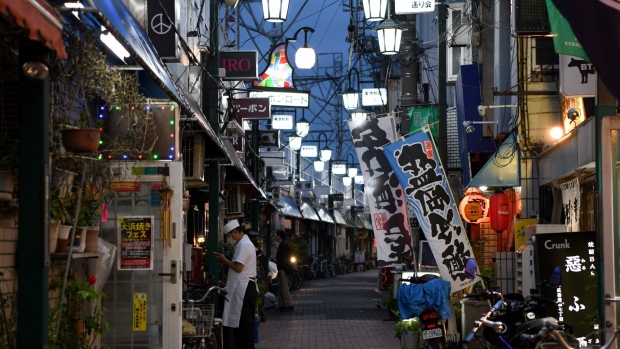May 23, 2020
Japan Set to Lift Emergency in Tokyo on Monday, Reports Say
, Bloomberg News

(Bloomberg) --
Japan is set to lift the state of emergency in Tokyo, its surrounding regions and the northern island of Hokkaido on Monday as new virus cases tail off, NHK and other local media reported.
Tokyo reported just two cases Saturday in the city of 14 million people, the lowest number of infections since the state of emergency was declared early last month. If the trends are confirmed in data for Sunday, the government plans to end the state of emergency, NHK reported, without saying where it got the information.
The move will bring the measure to an end across the whole nation a week ahead of schedule and enable more businesses to restart in the Tokyo region, whose economy is about the size of Canada’s.
Prime Minister Shinzo Abe declared an emergency in the capital and some other areas from April 7, later expanding it nationwide. From mid-May he began lifting it in places where the rate of new infections subsided. The Tokyo region -- the worst-hit by the virus -- was the final and largest site of infection.
Tokyo, with its surrounding prefectures of Chiba, Kanagawa and Saitama, has a combined population of about 35 million people and an annual output of 182.2 trillion yen ($1.7 trillion), which in global terms would make it the 11th largest economy on the planet.
While a European-style lockdown isn’t legally possible in Japan due to civil liberties enshrined in its postwar constitution, the state of emergency enabled local governments to instruct businesses to close or operate for shortened hours, and to ask residents to stay at home. Most complied, helping to bring the weekly infection rate in Tokyo below 0.5 people per 100,000 population over the course of a week, the government’s threshold for lifting the emergency.
Did Japan Just Beat the Virus Without Lockdowns Or Mass Testing?
Tokyo Governor Yuriko Koike has laid out guidelines for reducing risk as people gradually resume activities kept on hold for almost seven weeks. Neighboring South Korea has already seen a major cluster spread among nightclub-goers after loosening restrictions. Meanwhile, Abe has vowed to work with regional governments to prepare for a second wave of infections that experts say is almost inevitable.
©2020 Bloomberg L.P.






